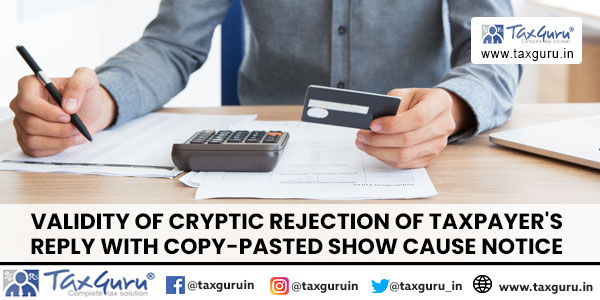Summary: The Calcutta High Court, in the case of M/S Jyoti Tar Products Private Limited & Anr. v. Union of India [2025 (1) TMI 1144], examined the validity of GST show cause notices (SCNs) that merely replicate content from pre-SCN intimations (e.g., DRC-01A) and summarily reject taxpayers’ replies as “unsatisfactory” without specific reasoning. In this case, the petitioner was accused of claiming input tax credit (ITC) on transactions with non-existent entities. Despite submitting a detailed response supported by evidence, the tax authority dismissed the reply without providing reasoning and issued an SCN that copied the earlier intimation. The Division Bench observed that tax authorities must adhere to the principles of natural justice, requiring them to consider taxpayer responses and provide reasoned decisions before issuing SCNs under Section 74(1) of the GST Act. The Court set aside the SCN, remanding the matter back to the authority with instructions to address the taxpayer’s contentions properly.

Points to Ponder
The practice of issuing GST show cause notices (SCNs) that are merely copy-pasted from pre-SCN intimations (e.g., DRC-01A Intimations or ASMT-10 Notices) and summarily rejecting the taxpayer’s detailed reply on the ground of being “unsatisfactory” raises critical legal questions. A significant precedent in this regard is the judgment of the Hon’ble Calcutta High Court in M/S Jyoti Tar Products Private Limited & Anr. v. Union of India [2025 (1) TMI 1144], which scrutinized the validity of such proceedings. The facts and the judgment of this case are analysed below to understand its implications.
Facts of the Case
A pre-SCN intimation in Form DRC-01A was issued to the petitioner, alleging that the petitioner had claimed input tax credit (ITC) on inward supplies from non-existent entities whose registrations had been cancelled. The intimation advised the petitioner to remit the ascertained tax. failing which a formal SCN would follow. In response, the petitioner submitted a detailed explanation, supported by relevant documents, and relied on various judicial precedents to substantiate their contention. However, the Proper Officer summarily rejected the reply as “unsatisfactory” without providing specific reasoning. The subsequent SCN merely replicated the contents of the pre-SCN intimation and failed to address the taxpayer’s contentions or evidence.
Aggrieved, the petitioner challenged the SCN by filing a writ petition before the Single Bench. The writ petition was dismissed on the grounds of non-maintainability at the SCN stage. The petitioner thereafter filed an intra-court appeal before the Division Bench.
Critical Observations by the Court
The Division Bench observed that once the authority has exercised its powers under Section 74(5) of the GST Act, it is incumbent upon the authority to duly consider the taxpayer’s reply before proceeding to issue a SCN under Section 74(1) of the Act. Like many other judgements Court disapproved the practice of rejecting the taxpayer’s reply on the mere ground that it was found unsatisfactory. Furthermore, the Court noted that the content of the SCN was largely copied from the earlier intimation and failed to address any of the contentions or evidence put forth by the petitioner in their reply.
Held by Court
Hon’ble Calcutta High Court set aside SCN and remanded the matter to the assessing authority with a direction to duly consider the petitioner’s reply and address the contentions raised therein. The Court held that if, upon due consideration, the authority still finds the reply unsatisfactory, it is at liberty to proceed in accordance with law.
Our Comments:
The judgment reaffirms that reasoning is the essence of any adjudicatory order. The judgment also underscores the importance of adhering to the principles of natural justice under the GST law. The Hon’ble Court has reiterated that:
- Tax authorities must provide reasoned orders, even at the SCN stage, to reflect due consideration of the taxpayer’s submissions.
- The rejection of a taxpayer’s reply without specific reasoning is not only arbitrary but also contrary to statutory provisions.
The decision also highlights a significant judicial trend, wherein courts have demonstrated readiness to intervene even at the SCN stage if procedural lapses result in the denial of justice. This ruling serves as a crucial precedent to safeguard taxpayers from arbitrary actions and ensure accountability in tax adjudication processes.
*****
CA Jignesh Kansara | Founder Partner DAKSM & Co. LLP, Chartered Accountants





